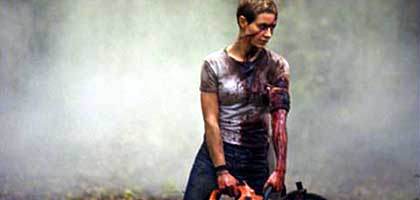
The Razor's Edge
Film of the Month: Switchblade Romance

A French slasher throwback, Switchblade Romance is deadly serious in giving its audience the pleasures of a damn good scare. By Mark Kermode.
Like the spectre of Michael Myers, repeatedly declared dead only to return again from the grave, 1970s-inflected horror movies just won't lie down and die. Already in the past 12 months we've seen high-octane remakes of George Romero's Dawn of the Dead and Tobe Hooper's The Texas Chain Saw Massacre. In the coming months the notoriously 'nasty' thrills of The Toolbox Murders will be revisited once again, with Hooper taking over the DIY-death honours from original director Dennis Donnelly. Meanwhile from France comes Switchblade Romance (Haute Tension), a riotous slasher throwback which writer-director Alexandre Aja describes as an attempt to return to "the roots of the genre, to give the audience a real 'battle for survival'."
"I'll never let anyone come between us again," promises heroine Marie at the beginning and end of this ferocious nightmare in which two young women go head-to-head with a relentless monster hell-bent on painting their world blood red. It's a promise she is determined to keep, even if honouring it means letting her repressed animal instincts off the leash. In a remote woodland farmhouse ("It's like a doll's house...") Marie and the family of her best friend Alex are besieged by an implacable killer who wields a cut-throat razor and a growling wood-saw with equal panache. Blood-spurting decapitations, wince-making eviscerations and hefty axings ensue as the killer runs (or more accurately plods) amok, taking the wild and worldly Alex captive and leaving the apparently chaste tomboy Marie to save the day. "The other girls were alone," insists Marie, who has been haunted by dreams of pursuing herself through darkened woods. "There are two of us - we'll be OK." But will Marie become a generic 'final girl' and triumph over adversity in the style of Halloween's Laurie Strode? Or will the spectacularly slimy killer, a portly sixtysomething man in greasy grey overalls who drives a beat-up van, chew her up and spit her out with scant regard for generic convention?
Filmed with an edgy stylishness that belies the tight six-week shoot, Aja's rip-roaring romp certainly gives horror fans more than their money's worth, terrorising (rather than patronising) those in search of a damn good scare. Over the course of its stripped-down 85-minute running time we are witness to a series of gruelling encounters played out against a splendidly abstract soundtrack packed with guttural moans, unworldly booms and insistent electrical hisses. While chirpy pop songs and innocuous mall music waft ironically over the airwaves ("You're just another girl," warns one song, "maybe nice, but not that smart..."), the ambient sound of Switchblade Romance creaks away like a rusty gate in hell, cranking up the knuckle-chewing tension and reminding us just what an inventively dangerous weapon the slasher genre can be when placed in disreputable hands.
Eschewing the knowing nods and winks of the postmodern slasher-cinema revival (Scream, I Know What You Did Last Summer, et al), Aja and co-writer Grégory Levasseur play their killer hand commendably straight even as the numerous generic references tempt them to crack a stylistic smile. Early scenes of Marie and Alex heading off towards predictable peril in a woodland retreat chime with a string of rape-revenge shockers from Wes Craven's Last House on the Left (1972) to Meir Zarchi's Day of the Woman/
I Spit on Your Grave (1978). Shades of The Evil Dead (1982) haunt the night-time exteriors of the farmhouse (prowled from ominously low angles and silhouetted against glowing moons and cloudy skies), while inside the sight of blood spraying theatrically on to bright-white walls recalls the giallo excesses of Dario Argento. Meanwhile a revolting early gag about oral sex and decapitated heads ("Look me in the eye...") confirms the film-makers' willingness to resort to outright repugnance, nodding their heads towards a string of gore classics from Bill Lustig's Maniac (1980) to Stuart Gordon's Re-animator (1985) and leaving us enticingly uneasy about just how far they'll go in their desire to shock.
To this end Aja is ably assisted by the monolithic presence of Philippe Nahon, who brings the heavyweight baggage of his vile Seul contre tous persona to bear on what is essentially an off-the-peg psycho-slasher villain. While his filthy overalls and shambling heavy-shoed gait recall the Michaels and Jasons of endless Halloween and Friday the 13th sequels, Nahon's methodically grisly dispatching of Alex's family owes more to the spectre of Leatherface from The Texas Chain Saw Massacre, and a sequence in which he takes a powertool to a car with intestine-ripping results seems a direct homage to the only memorable scene from TCM 2.
Maïwenn and Cécile de France do sterling work as Alex and Marie, the latter a particular revelation for anyone who caught her amiably ditzy turn in the recent Jackie Chan remake of Around the World in 80 Days. Unrecognisable from her more mainstream incarnation, de France dominates the screen as the crop-haired heroine who proves more than a match for her marauding male nemesis. It's a terrifically physical performance and a sinewy portrait of raw survival instinct that provides an easy point of identification for audience members of either sex - reminding us once again that the purest pleasures of slasher cinema are not sadistic but masochistic, focusing our attention on the trials (and eventual triumph?) of the victim rather than the actions of the aggressor. Unlike many of its predecessors, Switchblade Romance sidesteps the leery visual sexism that made some 1970s slashers such a boy's-own affair. Although Nahon's killer is earmarked early on as a necrophile rapist, his on-screen attacks provoke none of the bare-breasted titillation for which the genre became infamous. Instead, these grisly assaults are heard rather than seen, the sound of Nahon's animal grunting mixing with the shrieks of his victims in a manner that's terrifying rather than titillating.
The only false note is the final 'twist', which comes more as a befuddlement than as a surprise. Attempting to combine the arcane generic cross-gender unmaskings of Psycho (1960) and Dressed to Kill (1980) with an already clichéd post-Sixth Sense pay-off, the plot performs an abrupt volte face which is stylishly rendered but ultimately rather silly. In the film's enigmatic opening montage we clearly hear Marie asking "Is it recording?", thus establishing her as the narrator of the ensuing events. Yet though the breathless pace of the action continues to propel us headlong through the final battle, a few moments of sober consideration in the foyer as the credits roll reveal gaping holes in the daring denouement. Despite an early association of Marie's lonely sexual fantasising with the killer's arrival at the house (they both come at the same time) and the fairly explicit details of her dream, the resolution adds up only if the entire movie is seen as an extended dream-fantasy sequence - the great generic cop-out. No amount of 'clever' visual clues, such as fleeting shots of the killer's hands in feminine form, can explain away simple questions like 'Who was driving the van?' - questions in which Aja and Levasseur seem infuriatingly uninterested.
The only satisfying thing about this mischievous conclusion is the offence the final 'explanation' may cause the politically correct - if you thought the sexual politics of Basic Instinct were suspect, then the final reel of Switchblade Romance will have you dusting down your placards. Yet anyone reading any extra-textual significance into such daft on-screen shenanigans is even more in need of a reality check than Marie. Like last year's equally straight-faced Cabin Fever (which also demonstrated the benefits of not playing these throwback thrills ironically), Switchblade Romance inhabits a world of nightmare cinema that seems to have been conjured entirely from the fond adolescent memories of its unabashed-fan creators. As the tag-line for Last House on the Left told us all those years ago, in the end, "keep telling yourself: it's only a movie, only a movie..."
